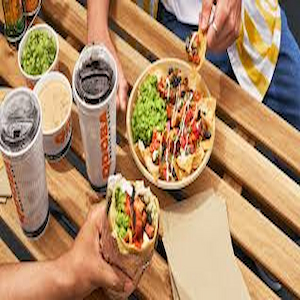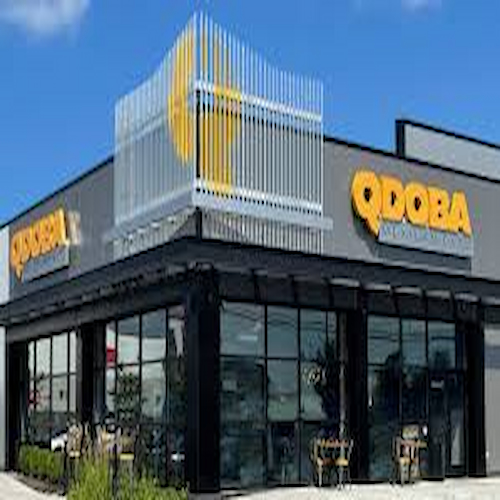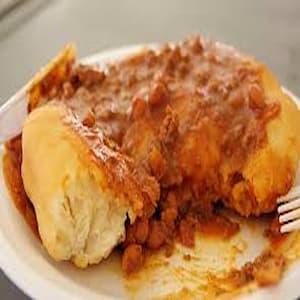Qdoba Mexican Eats is an American fast-casual restaurant chain known for its Mexican-inspired menu. Founded in 1995 in Denver, Colorado, the brand has grown significantly over the years, establishing itself as a competitor in the fast-casual dining sector. The restaurant chain is recognized for offering customizable dishes that appeal to a wide audience, including those with dietary restrictions.
QDOBA, History, and Growth
Qdoba was founded by Anthony Miller and Robert Hauser, who aimed to create a fast-casual restaurant that offered flavorsome Mexican cuisine. The first Qdoba location opened in 1995, quickly gaining popularity for its unique approach to fast food. Unlike traditional fast-food chains, Qdoba emphasized fresh ingredients and customizable options. In 2003, Qdoba expanded its footprint by entering the franchise market, which catalyzed its growth across the United States. As of 2023, Qdoba operates over 700 restaurants across the United States and Canada, with a presence in various states and urban areas.
Over the years, Qdoba has changed ownership several times, impacting its growth trajectory. In 2018, Apollo Global Management acquired Qdoba, which provided a renewed focus on expansion and brand rejuvenation. This acquisition enabled Qdoba to invest in new store designs and technology enhancements while maintaining its core values.
QDOBA Menu
Qdoba’s menu features a wide array of Mexican-inspired dishes tailored to satisfy varying tastes. Core menu items include burritos, tacos, nachos, and bowls. Customers can customize their meals by selecting ingredients from a range of options that include various proteins, salsas, and toppings.

A distinguishing feature of Qdoba is its commitment to using high-quality ingredients. The chain offers fresh avocados for guacamole made in-house daily, cage-free eggs, and antibiotic-free chicken. Moreover, Qdoba caters to diverse dietary preferences by providing vegetarian, vegan, and gluten-free options, appealing to health-conscious consumers. The introduction of plant-based protein alternatives has further helped Qdoba target an expanding market of plant-based eaters.
READ ALSO: Abra Beren’s Tomato Soup Recipe Scaled Up
In 2023, Qdoba also focused on seasonal and limited-time offerings to keep the menu exciting for returning customers. This strategy not only fosters customer engagement but also allows the chain to stay relevant in a competitive market. For example, collaborations with well-known culinary figures or local food festivals have yielded unique menu items that enhance brand visibility and attract new patrons.
QDOBA Business Model
The success of Qdoba can be attributed to its effective business model. Positioned in the fast-casual dining segment, Qdoba strikes a balance between quick service and the quality of food typically associated with full-service restaurants. This model allows for a more relaxed dining experience compared to fast food, appealing to consumers seeking a more enjoyable atmosphere.
Central to Qdoba’s business strategy is its emphasis on customer engagement and personalization. The restaurant encourages customers to create their meals according to their preferences, which fosters loyalty. The open kitchen concept allows diners to see their food being prepared, enhancing transparency and trust.
Technology and hospitality
Moreover, Qdoba has embraced technological advancements to improve operational efficiency and customer experience. The introduction of a mobile app has enabled online ordering, adding convenience for customers. The app also includes rewards programs, which incentivize repeat visits and further enhance customer loyalty.
Marketing Strategies
Qdoba’s marketing strategies play a crucial role in its brand identity and customer outreach. The brand’s messaging focuses on the quality and freshness of its food, along with the ability of customers to customize their meals. It capitalizes on social media platforms to engage with consumers, promoting not only its food offerings but also its values, such as sustainability and community involvement.
In recent years, Qdoba has launched campaigns aimed at specific demographics, including Millennials and younger consumers. By highlighting its commitment to fresh ingredients and diverse menu options, Qdoba resonates with health-conscious individuals and those exploring new dining experiences. Seasonal promotions and limited-time offerings are common tactics to generate buzz and excitement around the brand.
Another fundamental aspect of Qdoba’s marketing strategy is its involvement in local communities. By participating in local events or sponsoring community initiatives, Qdoba strengthens brand loyalty and fosters a positive image among consumers. This community engagement helps build long-term relationships with customers, ensuring a stable base of support.
Challenges and Future Prospects
Despite its successes, Qdoba faces challenges prevalent in the fast-casual dining sector. Competition remains fierce, not only from other Mexican fast-casual brands but also from a growing number of health-oriented restaurants. Furthermore, fluctuating ingredient prices and supply chain issues can impact profitability. Adapting to these challenges requires continuous innovation and strategic planning.
Looking ahead, Qdoba is poised for further growth as consumer trends emphasize healthful eating and customization. The brand has the potential to expand into international markets, bringing its unique dining experience to new audiences. Building on its technological investments could enhance customer experience and operational efficiency.
Sustainability
Sustainability is another area where Qdoba can differentiate itself. As consumers increasingly seek out brands with eco-friendly practices, it has the opportunity to enhance its commitment to sustainability through responsible sourcing, reducing waste, and promoting environmental awareness. This forward-thinking approach can strengthen brand loyalty while appealing to a new generation of environmentally conscious diners.
From its humble beginnings in Denver to its impressive national footprint, the company’s evolution reflects its ability to adapt to changing consumer preferences and market demands. With the implementation of innovative marketing strategies and a focus on sustainability, Qdoba is well-positioned for future growth. As it navigates the challenges of an ever-evolving food industry, Qdoba remains a notable player in providing flavorful, fresh, and customizable dining experiences.



